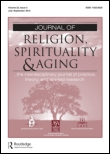
Journal of Religion Spirituality & Aging
Scope & Guideline
Advancing Understanding of Religion and Aging
Introduction
Aims and Scopes
- Exploration of Spirituality and Aging:
The journal investigates how spirituality impacts the aging process, examining the beliefs, practices, and experiences of older adults across various cultural and religious backgrounds. - Health and Well-being:
A significant focus is on the relationship between spirituality, religion, and health outcomes among the elderly, exploring how spiritual beliefs can enhance psychological and physical well-being. - Cultural Contexts of Aging:
The journal emphasizes the importance of cultural and religious contexts in shaping the experiences of aging, providing insights into how different communities approach aging and spirituality. - Support Systems and Care Models:
Research often highlights the role of faith communities and spiritual practices in providing care and support for older adults, particularly in contexts like dementia care and hospice. - Interdisciplinary Approaches:
The journal promotes interdisciplinary research, integrating insights from sociology, psychology, gerontology, and theology to offer a holistic understanding of aging and spirituality.
Trending and Emerging
- Spirituality and Mental Health:
An increasing number of studies focus on the relationship between spirituality and mental health outcomes for older adults, emphasizing how spiritual beliefs can serve as coping mechanisms during challenging life transitions. - Intergenerational Relationships:
Research exploring the role of spirituality in shaping intergenerational relationships is gaining traction, highlighting how spiritual beliefs influence family dynamics and caregiving across generations. - Cultural Sensitivity in Care:
There is a growing emphasis on culturally sensitive approaches to spiritual care in aging populations, particularly in diverse communities, reflecting a trend towards inclusivity in spiritual practices. - Impact of Social Networks:
The influence of social networks and community support on the spiritual well-being of older adults is increasingly recognized, demonstrating the importance of social capital in enhancing quality of life. - Innovations in Spiritual Care:
Emerging studies are exploring innovative models of spiritual care, including virtual support and community-based interventions, particularly in the context of the COVID-19 pandemic.
Declining or Waning
- Traditional Religious Practices:
There seems to be a waning emphasis on traditional religious practices as the sole framework for understanding spirituality in aging, with more focus shifting towards individual and personal spiritual experiences. - Age-specific Religious Norms:
The exploration of specific age-related religious norms is less frequent, indicating a potential shift towards broader themes of spirituality that transcend specific age categorizations. - Comparative Religion Studies:
While comparative studies of different religious traditions have been common, there appears to be a decline in this area, possibly as the journal focuses more on holistic and integrative approaches to spirituality. - Focus on Institutional Religion:
There is a notable decrease in studies centered on institutional religion's role in aging, as more research highlights personal spirituality and informal community support systems.
Similar Journals
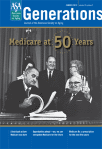
Generations
Connecting Research and Practice Across LifetimesGenerations, published by the American Society on Aging, serves as a vital interdisciplinary platform for scholars and practitioners within the field of aging and gerontology. With its ISSN of 0738-7806 and E-ISSN of 2694-5126, this journal has been a valuable resource since its inception in 1985, connecting research and practice across converging years and advancing discussions surrounding the complexities of aging and lifespan studies. Although classified in the Q4 quartile for categories such as Geriatrics and Gerontology, Life-span and Life-course Studies, and Public Health, its contributions are increasingly relevant in a rapidly aging society. The journal’s emphasis on critical issues surrounding aging makes it essential reading for health professionals, policy makers, and researchers dedicated to enhancing the quality of life for older adults. As it continues its publication journey up to 2024, Generations remains committed to fostering scholarly discourse and offering innovative insights in this crucial area of study.

Research in Gerontological Nursing
Bridging Nursing and Gerontology for Healthier FuturesResearch in Gerontological Nursing is a premier peer-reviewed journal dedicated to advancing the field of nursing as it intersects with gerontology. Published by SLACK INC, this influential journal provides an essential platform for researchers, clinicians, and educators focusing on the health and well-being of older adults. Since its inception in 2008, it has fostered critical discourse and innovation, bridging gaps between nursing practices and gerontological research. The journal proudly holds a Q3 ranking in both Geriatrics and Gerontology as well as Health Policy, and a Q2 ranking in miscellaneous Nursing categories as of 2023, reflecting its commitment to quality and relevance in these vital areas of study. While not open access, the journal offers a subscription-based model that guarantees readership and citation within the academic community. With its Scopus rankings highlighting its growing impact—ranked #23 in Nursing Gerontology and #59 in General Nursing—Research in Gerontological Nursing serves as an indispensable resource for those dedicated to improving care for the aging population.

Geriatrie et Psychologie Neuropsychiatrie du Vieillissement
Fostering Collaboration for Improved Geriatric OutcomesGeriatrie et Psychologie Neuropsychiatrie du Vieillissement is a pivotal academic journal dedicated to the multidisciplinary study of aging, encompassing the fields of geriatrics, neuropsychiatry, and psychological health in the elderly population. Published by JOHN LIBBEY EUROTEXT LTD, this journal fosters knowledge dissemination and innovation, contributing to the understanding of the complexities faced by aging individuals. With a broad scope that includes biological psychiatry and neuropsychology, it serves as a vital resource for researchers, healthcare professionals, and students engaged in geriatric medicine and mental health. Although currently classified in the Q4 category across various relevant medical and psychological disciplines, the journal addresses critical topics that are essential for enhancing quality of care and improving patient outcomes. Additionally, the journal is accessible via open access options, promoting wide-ranging readership and collaboration within the academic community. As the field continuously evolves, Geriatrie et Psychologie Neuropsychiatrie du Vieillissement remains commited to pushing the boundaries of research and practice in gerontology and neuropsychiatry.

Canadian Geriatrics Journal
Shaping the future of geriatric care through open access.Canadian Geriatrics Journal, published by MULTIMED INC, is a prominent platform dedicated to advancing the field of geriatrics and gerontology. With its esteemed status as a Q2 journal in both Geriatrics and Gerontology categories for 2023, it ranks favorably within the academic community, holding a 73rd percentile in Nursing Gerontology and a 59th percentile in Medicine Geriatrics and Gerontology according to Scopus metrics. Since its inception in 2011, the journal has aimed to foster innovation and disseminate pivotal research that addresses the complexities of aging populations. Researchers, healthcare professionals, and students interested in the intricacies of geriatric care will find a wealth of open-access resources that contribute significantly to enhancing practice and care methodologies in Canada and beyond. With its address located at 66 Martin St, Toronto, ON L9T 2R2, Canada, the journal stands as a vital resource for stakeholders in the geriatric field.
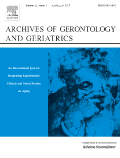
ARCHIVES OF GERONTOLOGY AND GERIATRICS
Pioneering research for the evolving landscape of aging.The Archives of Gerontology and Geriatrics, published by Elsevier Ireland Ltd, is a leading journal in the fields of Aging and Geriatrics and Gerontology. With an ISSN of 0167-4943 and an E-ISSN of 1872-6976, it has established itself as a crucial platform for disseminating high-quality research focused on the biological and psychosocial aspects of aging. The journal holds an impressive Q2 ranking in both Aging and Geriatrics and Gerontology, and a Q1 ranking in Gerontology and Health (Social Science) as of 2023, reflecting its significant impact in these disciplines. Additionally, the journal is ranked #33/371 in Social Sciences (Health) and #5/39 in Nursing (Gerontology) according to Scopus, showcasing its esteemed position in the academic community. Although currently not open access, the journal offers a wealth of research articles from 1982 to the upcoming 2025 that are vital for stakeholders including researchers, healthcare professionals, and students aiming to advance their understanding of aging processes and policies. Titles published within its pages contribute to shaping agendas in public health and gerontological practice, making it an essential resource for those involved in the study of the elderly population.
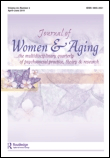
JOURNAL OF WOMEN & AGING
Navigating the Complexities of Women's Aging ExperienceJournal of Women & Aging, published by Routledge Journals, Taylor & Francis Ltd, stands as a pivotal resource in the interdisciplinary study of women’s health and gerontology. With a rich history since its inception in 1989 and an impressive convergence period extending to 2024, this journal addresses critical issues affecting women as they age, exploring topics that span from social policy to health care and psychological well-being. As a recognized publication in the fields of Gender Studies (Q2) and Geriatrics and Gerontology (Q3), it ranks favorably in Scopus, highlighting its commitment to advancing research and knowledge in these significant areas. Researchers, professionals, and students alike will find valuable insights within its pages as the journal seeks to promote understanding and foster discussion on the unique challenges and contributions of older women in society.
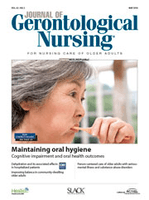
Journal of Gerontological Nursing
Advancing Care for Aging LivesThe Journal of Gerontological Nursing, published by SLACK INC, is a leading peer-reviewed journal dedicated to advancing the field of gerontological nursing through innovative research, clinical practice, and educational advancements. Since its inception in 1975, this journal has become a crucial resource for researchers, healthcare professionals, and students interested in the care and management of older adults. With an impact factor that reflects its significance within the disciplines of gerontology and nursing (Category Quartiles: Q3 in Gerontology and Q3 in Nursing), it serves as a platform for disseminating vital findings, best practices, and evidence-based approaches aimed at improving the quality of life for the aging population. While the journal maintains a print-only format, its content is invaluable for those looking to stay ahead in the rapidly evolving landscape of gerontological care. As it continues to publish until 2024, the Journal of Gerontological Nursing invites contributions that foster dialogue and innovation within this essential area of healthcare.

JOURNAL OF GERONTOLOGICAL SOCIAL WORK
Exploring multidisciplinary insights in gerontology.The JOURNAL OF GERONTOLOGICAL SOCIAL WORK, published by Routledge Journals, Taylor & Francis Ltd, serves as a pivotal platform in the multidisciplinary study of gerontology, specifically focusing on social work practices affecting older adults. Since its inception in 1979, the journal has cultivated a robust collection of scholarly articles that address critical issues in aging, incorporating diverse perspectives from nursing, social sciences, and social work disciplines. Currently, the journal holds esteemed rankings within various categories, including Q2 in Nursing (miscellaneous) and Q1 in Social Sciences (miscellaneous), showcasing its influence and relevance in the field. With its high Scopus ranking—#96 out of 604 in Social Sciences and #9 out of 45 in Nursing—this publication is essential for researchers and practitioners aiming to improve service delivery and practices surrounding elderly care. Though not offering open access, its contributions are nonetheless invaluable for fostering scholarly dialogue and advancing knowledge within gerontological social work. The journal's emphasis on evidence-based practice, innovative research methodologies, and policy implications makes it a critical resource for anyone committed to enhancing the lives of older populations.
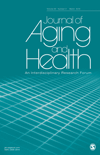
JOURNAL OF AGING AND HEALTH
Transforming knowledge in geriatric health research.The JOURNAL OF AGING AND HEALTH, published by SAGE PUBLICATIONS INC, is a preeminent peer-reviewed journal dedicated to advancing research in the field of gerontology and related disciplines. With an impressive impact factor and ranked Q1 across multiple categories including Community and Home Care, Geriatrics and Gerontology, and Health (Social Science), this journal has established itself as a vital resource for academics, clinicians, and policymakers alike. Spanning over three decades of publication from 1989 to 2024, it serves as a platform for innovative research and multifaceted discussions on aging, health, and the interplay of social factors influencing the elderly population. The journal's rigorous standards for publication ensure high-quality contributions that are impactful and relevant, making it an essential read for those dedicated to improving the health and quality of life for older adults. Although it is not an open-access journal, it provides comprehensive insights that are critical to understanding the complexities of aging in today's society.

JOURNAL OF PSYCHOLOGY AND THEOLOGY
Advancing Insights at the Intersection of Belief and BehaviorJOURNAL OF PSYCHOLOGY AND THEOLOGY, published by SAGE PUBLICATIONS INC, serves as a vital interdisciplinary platform for researchers, professionals, and students interested in the intersections of psychological and theological inquiry. With an ISSN of 0091-6471 and an E-ISSN of 2328-1162, this esteemed journal has been providing scholarly articles since its inception in 1990, reflecting a commitment to advancing knowledge through the years 1992 and from 1996 to 2024. Its exceptional reputation is highlighted by its categorization in Q3 in Psychology (miscellaneous) and Q1 in Religious Studies for 2023, ensuring that it remains a leading resource in these fields. Though not an open-access journal, it offers diverse access options that support rigorous academic research. As it explores the nuanced interrelationship between psychological constructs and theological concepts, JOURNAL OF PSYCHOLOGY AND THEOLOGY continues to foster important discussions that resonate within contemporary society, making it a must-read for anyone engaged in these crucial areas of study.